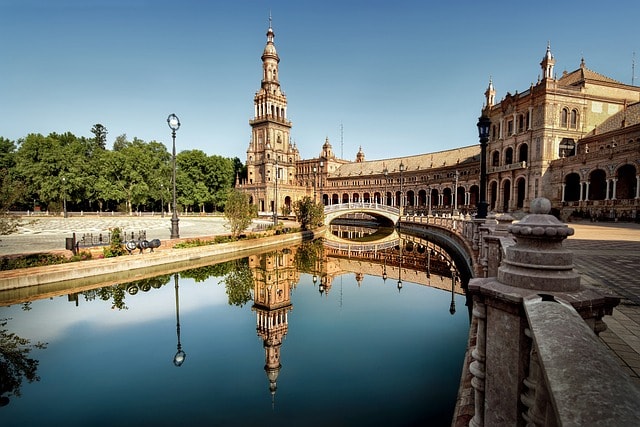
Introduction
Moving to Spain from the UK is an exciting opportunity for many British nationals seeking a new chapter in life. With its warm Mediterranean climate, rich cultural heritage, and varied landscapes—from bustling cities to tranquil coastal towns—Spain offers something for everyone. Whether you are drawn to the lower cost of living in Spain, looking to retire in one of the sunniest destinations in Europe or eager to explore new career prospects, Spain presents a wealth of possibilities for UK nationals.
Spain has experienced significant changes in its relationship with the UK post-Brexit, and while it continues to be a popular destination for British citizens, moving to Spain now involves navigating a more complex set of residency, visa, and tax requirements. From obtaining the right visas in Spain to managing tax residency and securing healthcare, there are several key factors that UK nationals must take into account when planning a move to Spain. It is also crucial to obtain a residence permit for a long-term stay, as it enables individuals to live, work, and access healthcare in Spain.
This guide is designed to help you navigate the essential steps of relocating to Spain, offering detailed insights into property, tax planning, residency options and more. With careful planning and the right professional advice, you can ensure a smooth and successful transition to life in Spain.
Article Summary
This guide covers everything UK nationals need to know before moving to Spain. From tax residency rules to property decisions and healthcare considerations, this article is a one-stop resource to help you relocate smoothly. You’ll learn about the most crucial aspects of moving to Spain from the UK, including:
-
How to exit the UK tax system without unnecessary penalties
-
Residency options and how to qualify
-
Property: Renting vs. buying in Spain
-
Healthcare and private insurance options
-
Education for families moving with children
-
Key financial planning tips to optimize your move.
Key Takeaways

-
Tax Residency: Understand how to minimize tax liabilities when transitioning from the UK to Spain.
-
Property: Renting before buying is recommended to understand the local housing market in Spain.
-
Healthcare: UK nationals may need private healthcare insurance before public coverage becomes available in Spain.
-
Financial Planning: It’s essential to seek professional advice to manage your pensions, investments and inheritance tax.
-
Residency: Applying for the correct visa—whether the Non-Lucrative Visa, Golden Visa or others—ensures legal living and working in Spain.
Background About Spain Post Brexit
Spain has long been a favored destination for British nationals due to its beautiful Mediterranean climate, rich culture, and affordable lifestyle. Despite the changes brought about by Brexit, Spain continues to welcome UK nationals seeking to make it their new home. However, post-Brexit regulations mean that UK nationals need to plan their move carefully, especially regarding tax residency and visa requirements.
Living in Spain: What to Expect

Living in Spain offers a captivating blend of Mediterranean culture, modern infrastructure, and a lifestyle that appeals to a wide range of preferences. Whether you are seeking the vibrant energy of cosmopolitan cities like Madrid and Barcelona, the laid-back charm of coastal towns such as Marbella or Alicante or the rich historical attraction of places like Granada and Seville, Spain truly has something for everyone.
Diverse Regions and Lifestyles
Spain’s diverse regions provide varied living experiences. If you enjoy bustling city life, Madrid and Barcelona are the cultural and economic hubs, offering world-class museums, restaurants, and thriving business districts. These cities are perfect for those seeking dynamic career opportunities and a fast-paced lifestyle, but keep in mind that the cost of living in these cities tends to be higher, particularly in terms of housing and daily expenses.
For those who prefer a slower pace, coastal towns such as Marbella, Costa del Sol, or Valencia offer year-round sunshine, beautiful beaches, and a more relaxed atmosphere. These areas are particularly popular among retirees and families seeking a quieter life, with excellent healthcare facilities and a welcoming expat community. The Balearic Islands, including Mallorca and Ibiza, also offer a more secluded, resort-style living experience, appealing to those who value privacy and luxury.
Cost of Living in Spain
While Spain generally boasts a lower cost of living than the UK, the reality can vary significantly depending on the region. Urban centers like Madrid and Barcelona are more expensive, particularly when it comes to property prices and rentals. On the other hand, smaller cities and rural areas in regions like Andalucia and Extremadura offer much more affordable living options, from housing to daily expenses.
Compared to many other European countries, Spain offers lower living costs, but average salaries are also lower, which is an important consideration for expats and retirees.
Utility costs, groceries, and dining out are generally cheaper across Spain, especially compared to the UK. However, it’s important to budget carefully, as some hidden costs—like private healthcare or international schooling for families—can add up depending on your personal circumstances.
Climate in Spain

Spain’s climate is another factor that draws many UK nationals to relocate. The country enjoys some of the best weather in Europe, with long, hot summers and mild winters in most regions. Southern Spain, including Andalucia and the Costa del Sol, experiences scorching summer months but mild, sunny winters, making it ideal for those who want to escape the UK’s colder climate.
In contrast, northern regions like Galicia and Basque Country have a more temperate climate, with cooler summers and more rainfall throughout the year, reminiscent of the weather in parts of the UK. The climate can be a major determining factor in choosing where to live, so consider what suits you best before making a decision.
Community and Expat Life
The social life and sense of community you’ll experience in Spain largely depend on where you settle. Major cities like Madrid and Barcelona are melting pots of international cultures, where you’ll find a diverse mix of locals and expats from all over the world. There are many opportunities for networking, both socially and professionally, especially in these cosmopolitan environments.
In contrast, smaller towns and coastal areas tend to have tight-knit communities where expats often integrate well, thanks to the welcoming nature of both local residents and other expats. Places like the Costa Blanca and Marbella are known for having strong British expat communities, offering a home away from home where English is widely spoken, and British goods are readily available.
In conclusion, Spain offers a variety of lifestyle options depending on your preferences, whether you’re looking for vibrant city life, a peaceful beachside retreat, or a quiet countryside existence. However, it’s important to thoroughly research the local cost of living, climate, and community feel of your chosen location to ensure it aligns with your personal and financial goals.
Key Things to Consider If You Are Planning on Moving to Spain from UK
Visit Spain and Choose the Right Region to Live
Before making a permanent move, it is vital to spend time exploring different regions of Spain. Each region offers a unique lifestyle, culture, and climate. The bustling cities of Madrid and Barcelona provide a cosmopolitan atmosphere, while the Costa del Sol attracts retirees with its warm climate and relaxed lifestyle. Northern Spain, such as Basque Country or Galicia, offers cooler weather and picturesque landscapes.
Exploring Different Regions in Spain:
-
Andalucia: Known for its stunning beaches and rich cultural heritage, Andalucia, especially cities like Marbella and Malaga, is popular among expats.
-
Valencia: This region boasts affordable living costs and beautiful Mediterranean beaches, making it attractive to both families and professionals.
-
Catalonia: With Barcelona as its capital, Catalonia offers a vibrant cultural scene and strong economy, ideal for professionals.
-
Balearic Islands: Mallorca and Ibiza combine tranquil living with lively social scenes, offering an idyllic island lifestyle.
Taking multiple trips to different areas is recommended to find a region that fits your lifestyle preferences and needs.
Renting Before Buying Property in Spain
Spain’s property market can fluctuate, and many UK expats opt to rent before purchasing to get a better feel for local conditions. Renting provides flexibility and gives you time to explore different neighborhoods.
Key Considerations:
-
Rental Contracts: Typically lasting one year, but shorter leases may be available. Always review contracts carefully, ideally with a property lawyer.
-
Rental Prices: High in cities like Madrid and Barcelona, while regions like Valencia and Andalucia offer more affordable options.
-
Serviced Apartments: A convenient, fully furnished option for short-term stays while you search for a permanent home.
Understanding Spain Visa Options for UK Nationals
Post-Brexit, UK nationals need a visa to reside in Spain long-term. The type of visa you apply for depends on your situation. It is necessary to contact the Spanish consulate for visa applications, including collecting visas, submitting applications, and obtaining detailed guidance on the required documentation.
Popular Visa Options:
-
Non-Lucrative Visa: Ideal for retirees or those with passive income. Requires proof of financial resources (around €27,792 annually).
-
Golden Visa: Available for those investing €500,000 or more in Spanish property. This visa grants residency and allows travel within the Schengen Zone. The Government has already indicated that this visa option will be discontinued.
-
Digital Nomad Visa: Perfect for remote workers, allowing residency while working for foreign companies.
-
Highly Skilled Worker Visa: Requires a job offer from a Spanish company and is aimed at professionals in high-demand fields.
Exiting the UK: Managing Your Departure
Leaving the UK involves more than just relocating your belongings. Proper tax planning is essential to avoid unnecessary financial complications. Additionally, it is crucial to follow guidance from Spanish authorities during the relocation process to ensure compliance with local regulations and avoid potential penalties.
Key Steps:
-
Timing Your Departure: It’s advisable to leave the UK at the end of the UK tax year (April 5th) to avoid dual tax obligations.
-
UK Statutory Residency Test (SRT): Completing the SRT helps determine if you’ll still be a UK tax resident.
-
Form P85: File this with HMRC to officially inform them of your departure and adjust your tax status.
Managing Succession Tax in Spain and Inheritance Tax in the UK

While Spain has its own Spanish succession tax rules, UK nationals may still be subject to UK inheritance tax (IHT) even after living in Spain.
Key Considerations:
-
UK Inheritance Tax: Charged at 40% on estates valued over £325,000 for individuals and £650,000 for couples excluding any principal private residence tax relief; UK domiciled individuals may be liable for worldwide assets.
-
Spanish Inheritance Tax: This varies by region. For example, Andalucia offers generous exemptions for direct descendants, with a €1 million tax-free threshold for spouses and children.
Professional estate planning advice is essential to navigate both UK and Spanish inheritance tax regulations and reduce liabilities.
Tax Residency in Spain: What You Need to Know

Becoming a tax resident in Spain can have significant implications for your income and assets. You are considered a tax resident if you:
-
Spend more than 183 days in Spain per year.
-
Have your main economic interests in Spain.
-
Have family living in Spain.
Spain’s Double Taxation Agreement with the UK prevents you from being taxed on the same income in both countries, but professional tax advice is recommended to ensure compliance.
Opening a Bank Account in Spain

Opening a Spanish bank account is essential for daily life, such as paying bills and rent. Most banks require your NIE (foreigner identification number) to open an account. It’s also important to contact the local town hall for administrative procedures, as they can provide information on essential services and legal documentation.
Requirements:
-
Proof of ID (e.g., passport).
-
Proof of Spanish address.
-
Employment status or proof of income.
Consider using international banks like Santander or BBVA, which offer services tailored for expats.
Healthcare in Spain: Public vs. Private Health Insurance

Spain’s healthcare system is among the best in Europe, with both public and private options available. Spanish nationals benefit from the country’s efficient healthcare system, which provides access to the National Health Service (Sistema Nacional de Salud). For retirees or visa holders like the Non-Lucrative Visa, private health insurance is mandatory for the first year.
Key Points:
-
Public Healthcare: Free for those working in Spain or retired UK nationals who transfer their health rights using the S1 form.
-
Private Health Insurance: Offers quicker access to specialists and private hospitals, and is affordable compared to other countries.
Cost of Living in Spain
The cost of living in Spain varies by region. While cities like Madrid and Barcelona have higher costs, smaller towns and rural areas offer a more affordable lifestyle.
Major Expenses:
-
Housing: Renting or buying property can vary greatly. Property prices in Barcelona and Madrid are higher than in other regions.
-
Everyday Costs: Groceries, transport, and dining out are generally cheaper than in the UK, offering a more affordable standard of living.
Education and Schooling in Spain

Families moving to Spain have access to various schooling options, including public, private, and international schools.
Schooling Options:
-
Public Schools: Free for residents and follow the Spanish curriculum, though classes are typically taught in Spanish.
-
Private and International Schools: For those seeking continuity with the British curriculum, international schools are a popular choice, following either the British or International Baccalaureate curricula.
Why Choose Spain?

Spain remains one of the most attractive destinations for UK nationals due to its Mediterranean lifestyle, warm weather, and affordable cost of living Spain. The country offers a robust healthcare system, excellent transport infrastructure, and a high standard of living. Moreover, the Golden Visa and other residency options make it easy for UK nationals to establish a new life in Spain.
Professional Guidance: Why You Need a Financial Advisor

Relocating to Spain involves complex financial decisions, especially regarding tax residency, inheritance tax, and investments. Consulting a certified financial advisor experienced in both UK and Spanish tax laws is crucial to making informed choices.
Frequently Asked Questions (FAQ)

How do I become a resident in Spain as a UK national?
Since Brexit, UK nationals need to apply for a visa to gain residency in Spain. Common visa options include the Non-Lucrative Visa, which is for those with sufficient passive income who do not need to work, and the Golden Visa, which requires a minimum investment of €500,000 in Spanish property (although this may end soon.) Obtaining a Spanish residence permit is crucial for legal residency and its implications on travel limits within the Schengen area. After living in Spain for five years on a temporary visa, you can apply for permanent residency.
What are the tax implications of moving to Spain from the UK?
Once you become a tax resident in Spain (i.e., you spend more than 183 days in a calendar year in Spain), you will be subject to Spanish income tax on your worldwide income. Spain has a progressive tax system, and the rates can vary depending on your earnings. There is a Double Taxation Agreement between the UK and Spain to ensure that you are not taxed twice on the same income. It’s advisable to seek professional tax advice to manage both UK inheritance tax and Spanish tax liabilities.
What is the cost of living in Spain compared to the UK?
The cost of living in Spain is generally lower than in the UK, especially in smaller cities and rural areas. Spain offers cheaper groceries, dining out, and transportation costs. However, large cities like Madrid and Barcelona can have higher property prices and rental costs. Healthcare is more affordable, and the absence of certain taxes like VAT on some goods can help reduce living costs further.
Can I access healthcare in Spain as a UK national?
Yes, but the process depends on your residency status. If you are employed or self-employed and contributing to Spanish social security, you will be eligible for public healthcare in Spain. Retirees can transfer their health rights via the S1 form. Many expats opt for private healthcare insurance, especially during their initial time in Spain or if they are on the Non-Lucrative Visa, which requires proof of private health coverage. Private healthcare is affordable and offers quicker access to specialist services.
Do I need a visa to live in Spain after Brexit?
Yes. Since Brexit, UK nationals can no longer stay in Spain beyond 90 days in a 180-day period without a visa. To live in Spain for longer periods, you will need to apply for a visa, such as the Non-Lucrative Visa, Golden Visa, (this is likely to end soon) or Digital Nomad Visa Spain. Each visa has its own specific requirements, and it’s essential to select the one that fits your circumstances. There are different types of Spanish visa available for long-term stays, so make sure to research and choose the right one for your needs.
What is the Non-Lucrative Visa, and who qualifies for it?
The Non-Lucrative Visa is designed for non-EU citizens who have sufficient passive income to support themselves without working in Spain. To qualify, applicants must demonstrate an annual income of at least €27,792 from pensions, savings or investments. This visa is particularly popular with retirees and individuals with independent wealth. It is initially granted for one year and can be renewed for successive two-year periods. Additionally, a self-employed person moving to Spain must meet specific requirements, including obtaining the necessary permits and demonstrating financial stability and compliance with local commercial regulations.
Can I work in Spain with a Non-Lucrative Visa?
No, the Non-Lucrative Visa does not permit holders to work in Spain. It is intended for those who can support themselves through passive income such as pensions, rental income or investments. If you intend to work in Spain, you would need to apply for a different visa, such as the Highly Skilled Worker Visa or seek employment through a local Spanish company.
How can I transfer my UK pension to Spain?
To optimize your pension for Spain’s tax system, you can consider transferring your UK pension to a Qualifying Recognized Overseas Pension Scheme (QROPS). This can offer tax advantages, including potentially avoiding the UK lifetime allowance limit. It’s important to work with a certified financial advisor to ensure your pension is structured properly and that you minimize tax liabilities under both UK and Spanish law. You also need to transfer your pension a calendar year prior to establishing your residency in Spain to avoid the full amount of your pension being treated as income and taxed on transfer.
Do I still need to pay UK inheritance tax if I move to Spain?
Yes, you may still be subject to UK inheritance tax (IHT) if you are considered UK domiciled. Even if you become a tax resident in Spain, your estate may be taxed by HMRC based on your UK domicile status. Domicile is a complex legal concept, and changing it can be challenging. To minimize both UK IHT and Spanish succession tax, seek advice from a professional on how to structure your assets effectively.
How can I avoid capital gains tax when selling property in Spain?
In Spain, you may be eligible for capital gains tax relief if you are selling your main residence and reinvest the proceeds into another property within the EU/EEA. However, post-Brexit, if you are a UK national and sell a property in Spain after becoming a resident, you may be subject to Spanish capital gains tax. Professional advice is recommended to navigate the complex rules and avoid potential tax penalties.
What is the Digital Nomad Visa, and how does it work?
The Digital Nomad Visa Spain is designed for remote workers and freelancers who want to live in Spain while working for foreign companies or clients. It provides a flexible residency option without needing to switch employers or seek local employment. This visa is part of Spain’s efforts to attract digital nomads and freelancers from around the world.
How do I avoid double taxation between the UK and Spain?
There is a Double Taxation Agreement between the UK and Spain, ensuring you are not taxed on the same income in both countries. However, you must declare your worldwide income in Spain if you are a tax resident. Consulting with a certified financial advisor will help you navigate these complexities, ensuring you remain compliant while minimizing your tax liabilities in both jurisdictions.
Can I buy property in Spain if I’m a UK national?
Yes, UK nationals can buy property in Spain without restrictions. However, you will need to obtain a NIE (Número de Identificación de Extranjero), which is an identification number for foreigners required for property purchases, opening a bank account, and other official transactions. Property prices can vary significantly depending on the region, with Madrid and Barcelona generally more expensive than other areas like Valencia or Andalucia.
What schooling options are available for UK expats moving to Spain with children?
Spain offers a variety of schooling options, including public schools, private schools, and international schools. Public schools follow the Spanish curriculum and are free for residents, while international schools often offer the British or American curricula and teach in English. Private schools are also available, though they come with tuition fees. Most expats with older children opt for international schools to ensure continuity in education.
Is it possible to retire in Spain from the UK, and what are the requirements?
Yes, UK nationals can retire in Spain. The most common option for retirees is the Non-Lucrative Visa, which requires proof of sufficient income from pensions or savings (around €27,792 per year). Spain offers a high-quality lifestyle for retirees, with excellent healthcare, a lower cost of living than the UK and beautiful weather. Additionally, retirees can consider applying for Spanish citizenship, which requires living in Spain for a minimum of 10 years and forfeiting UK citizenship. The benefits of obtaining Spanish citizenship include unrestricted travel within the EU and access to certain health benefits. It’s essential to consult with a financial advisor to plan for taxes, pension transfers and inheritance tax.
Conclusions and Call to Action

Moving to Spain offers significant advantages, from a lower cost of living to tax efficiencies, but it requires careful planning. Our experienced team of relocation specialists can assist you with everything from tax planning to property acquisition and visa applications.
Contact us today to ensure your move to Spain is as seamless as possible!
Contact Us Today

Are you ready to move to Spain from UK?
At Advice for Expats, we understand that expatriate life comes with a unique set of financial challenges and opportunities.
Our extensive network of trusted partners across multiple professional disciplines is here to provide you with the guidance and support you need to thrive as an expat.
We are driven by the fundamental belief in nurturing meaningful, deep and lasting client relationships; and the power of engaging in dialogue to craft solutions that truly resonate with client needs. We stand by the principles of transparency, active listening and extensive expertise as the keystones of our service.
Let us help you ensure relocating to Spain is smooth and successful.
Start your expat journey with us now
For professional advice you can arrange a free initial consultation with a trusted global mobility expert in Spain on:
Telephone: +350 5600 5757
Email: [email protected]
Useful Resources

-
For further information about moving to Spain from the UK please visit the website page: https://adviceforexpats.com/moving-to-spain-from-uk-permanent-residency/
-
Further information can also be found by visiting the website page: https://adviceforexpats.com/countries/spain/
-
Other useful sources: Living in Spain – GOV.UK
-
Other useful sources: https://www.gov.uk/guidance/get-your-income-tax-right-if-youre-leaving-the-uk-p85
-

